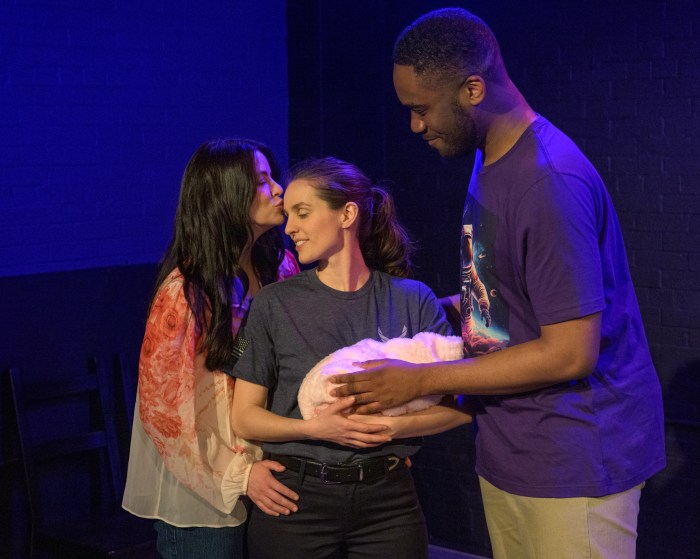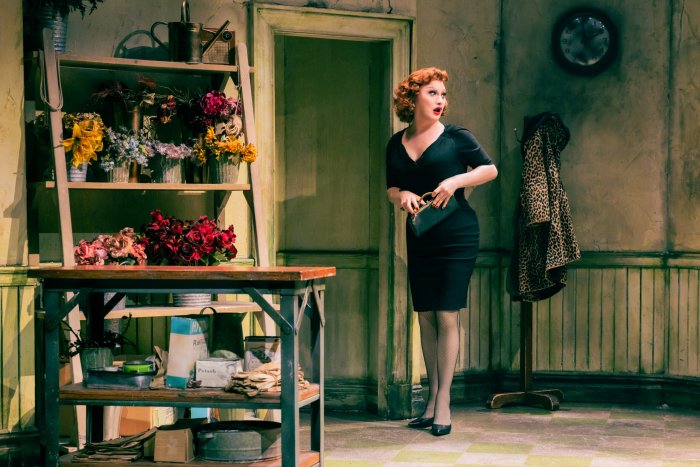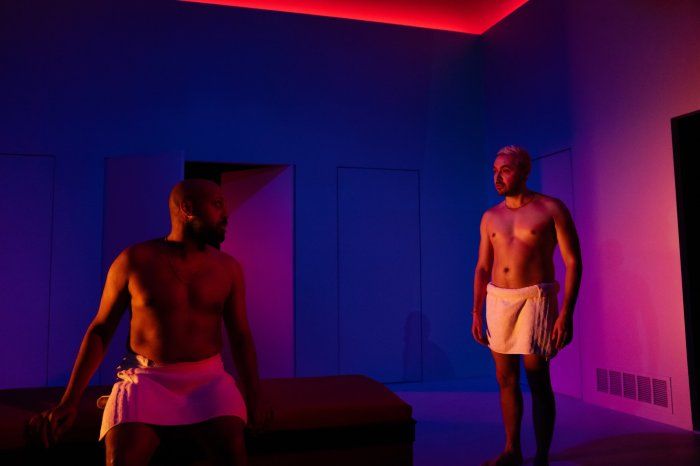Shakespeare’s comedy crossed withTin-Tin’s lively animation
The Aquila Theater Company’s relentless need to innovate is both its strength and its weakness.
The troupe’s newest production, Comedy of Errors, is theatrically dazzling and visually inventive—more than it needs to be by half. The Aquila group impresses with wit, energy, and a fresh approach to one of Shakespeare’s lesser-known comedies, but the play eventually bogs down under the weight of one too many rapid-fire gimmicks.
Before that failure becomes crippling—in the play’s last twenty minutes or so—the production displays ideas and talent that are truly delightful. The question is whether the troupe’s clever stagecraft illuminates Shakespeare’s play or exists merely to challenge and amuse the players themselves.
Is the troupe a little too taken with its own cleverness?
Director Robert Richmond sets this Comedy of Errors in a Turkish Casbah; more particularly, it’s a Turkish Casbah as seen in the fish-out-of-water cartoons of Tin-Tin, the fey boy detective with a famous cowlick (drawn, incidentally, by gay Belgian illustrator Hergé). Whether this contrivance—what Shakespeare adaptation would be complete without one?—is appropriate to the play is debatable. But what allows for no dispute is that the concept is brilliantly realized.
The play’s prologue, which tells how the play’s two sets of twins were born, separated, and then lost by their parents, is narrated in a witty marionette pantomime evocative of the frames of a cartoon. Another witty comic book touch is that many of the actors’ costumes and some of the props are lined with black piping, suggesting the outlines of drawings on a page. Indeed, the play’s costume, lighting, and production design are all executed with a brio that is all the wittier for its economy.
The casting is not free from topsy-turvy reversals. In this production, the play’s two—yes, two!—pairs of twins are played by one actor each. The effect evinces some dazzling strutting and fretting from Louis Butelli and Mark Saturno, who play the two Antipholuses and two Dromios, respectively (the twins share names as well). Each actor differentiates between the two roles by donning glasses, and a different set of gestures and accent. In both cases, Antipholus is master, and Dromio, slave.
The Syracuse twins whose visit to Ephesus causes the identity confusion—are played like British travelers out of an E.M. Forster novel. In this couple, the relationship between master and servant is one of affection, with distinctly homoerotic overtones. The Ephesus pair, meanwhile, are combative, in a rowdy, Guy Ritchie kind of way, which no doubt contains homosexual overtones of its own.
Though they’re often encouraged to mug and over-emote to make their meaning clear, the actors are on the whole impeccable, showing what a traveling, repertory troupe can do for ensemble timing and comfort with the language. But with the trick casting, it’s Butelli and Saturno who really shine. The runty, sunken-cheeked Butelli was simply born to play the fool.
One becomes exhausted just watching his physical feats as one character after the next takes her potshot. Meanwhile, Saturno, with just a few choice gestures and facial expressions, differentiates his Antipholus to the degree that I had to wonder if there really were different actors playing the two roles, as the program playfully (or, rather, confusingly?) suggests. In one of the best scenes of the play, Antipholus of Syracuse strikes up an impassioned tango with his supposed sister-in-law, Luciana, then recites an ode to love that is striking in its earnestness. The beauty of the language and Saturno’s unadorned reading of it make it the play’s most memorable moment.
Another fine staging occurs not long after, when Dromio gives Antipholus an account of his own tryst with a kitchen wench—though the credit is as much Shakespeare’s as it is Butelli’s.
With what can only be described as the dictionary definition of wit, Dromio compares the wide-girthed kitchen wench to a globe of the world (never mind that the play was originally performed in Shakespeare’s Globe theater, which no doubt lent a further level of topical humor):
Ant. S. Then she bears some breadth?
Dro. S. No longer from head to foot than from hip to hip: she is spherical, like a globe; I could find out countries in her…
Ant. S. Where France?
Dro. S. In her forehead; armed and reverted, making war against her heir.
Ant. S. Where England?
Dro. S. I looked for the chalky cliffs, but I could find no whiteness in them: but I guess it stood in her chin, by the salt rheum that ran between France and it…
Ant. S. Where stood Belgia, the Netherlands?
Dro. S. O, sir! I did not look so low.
After too many Freddie Prinze, Jr. adaptations and soporific Hamlet star vehicles, such moments make you grateful the Aquila group has chosen to dust off The Comedy of Errors [Aquila dropped “The” from the title] for a fresh airing even if the moments when the play shines on its own merits are few.

































